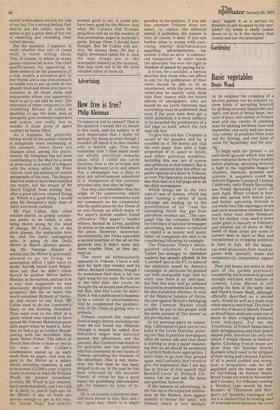How free is free?
Philip Kleinman
To censor or not to censor? That is the question I would like to return to this week, and the subject is of such importance that I make no apology for doing so even though I sounded off about it in this column only a month ago. You may remember that I then made some not wholly uncritical remarks about what I called the Levin Doctrine, that is the principle laid down by Bernard Levin and others that a newspaper has a duty to print any advertisement submitted to it, irrespective of the contents provided only that they be legal.
You may also remember that the origin of the controversy which occasioned Levin's comments (and my comments on his comments) was the publication by the Times of an anti-Zionist ad which many of the paper's Jewish readers found offensive. The paper's leader writers, backed by Levin, justified its action in the name of freedom of the press. However, somewhat
inconsistently, the Times cancelled a second insertion of the ad on the grounds that it didn't want any more trouble. Now, as they say, read on
The same ad subsequently appeared in Tribune. I have a soft spot for both that weekly and its editor, Richard Clements, though I do sometimes find then a bit too right wing for my taste. He told me at the time that, like Levin, he thought the ad stupid and offensive but that, also like Levin, he didn't think it was a publication's business to be a censor of advertisements.
And he condemned the pusillanimity of the Times in giving way to protests.
Tribune received the expected flood of angry letters, including one from its old friend Ian Mikardo (though it should be added that Mikardo's anger was directed against the advertisers, not the journal). But Clements has stuck to his principles and has published editorial comments in two issues of Tribune upholding the freedom of the advertiser. This is not, moreover, the first time he has been obliged to do so. In the past he has been criticised by his socialist friends, of whom he has a good many, for publishing anti-socialist ads, for instance by Aims of Industry.
He is an honest, consistent man, and more power to him. But, and I say again but, there is a slight paradox in his position. If you ask him whether Tribune does not select, i.e. censor, the editorial matter it publishes, the answer is that, of course, it does. If you ask further what is wrong with exercising similar discrimination regarding advertisements, his answer is that an ad is "a commercial transaction." In other words the advertiser has won the right to freedom of speech by paying for it.
Is it not, for a socialist, a curious doctrine that those who can afford to pay for the publication of their views should be able to do so uncensored, while the poor, whose views may be equally valid, must take their chance with the letters editors of newspapers, who are bound by no Levin Doctrine that everything must be published? And even if the poor man does get a letter published, it is most unlikely to be awarded the prominence of a full page to itself, which the rich man can buy.
To give him his due, Clements is aware of the paradox and he is troubled by it. He points out that his own paper does allot a high proportion of its space to letters, and other political weeklies, including this one, are of course also generous in that respect. But it must be admitted that the effect on public opinion of a letter in Tribune, or even The Spectator, is somewhat less than that of a full-page ad in all the daily newspapers.
Which brings me to the very topical case of Amoco, which has been running a series of such full-page ads leading up to the presentation of its "case for exempting North Sea gas from petroleum revenue tax." The campaign cost the company £100,000 for nine days of national newspaper advertising, but Amoco is reported to regard it as money well spent. Other oil companies are said to be considering following its example.
The Financial Times's distinguished columnist C. Gordon Tether (no stranger to Spectator readers) has already alluded, in his 'Lombard' spot in the FT, to some of the questions posed by Amoco's campaign. In particular he pointed out with unarguable logic that for every case there is an 'anti-case,' but that this may well go unheard because its proponents lack money. He also wondered whether, in view of the financial balance of forces, the case against Britain's belonging to the Common Market could possibly be put to the people with the same amount of 'fire power' as the pro-Market one.
In my previous piece on censorship, I attempted to pick one or two holes in the Levin Doctrine, pointing out that in practice newspapers often do censor ads and that there is nothing to stop a paper requesting that an ad should be presented in terms it finds more appropriate. I don't want to go over that ground again, and I certainly don't want to give the impression that I am any less in favour of free speech than Bernard Levin or Richard Clements. Let me just ask the latter one question, however.
If the balance of advertising, in the run-up to the expected referendum on the Market, does appear unfairly to favour the 'pros', will Tribune, which is very strongly 'anti,' regard it as a service to freedom to sell its space to the 'pro' lobby? Or, when it really comes down to it, is it the money that counts and not the principles?
Gardening


























 Previous page
Previous page